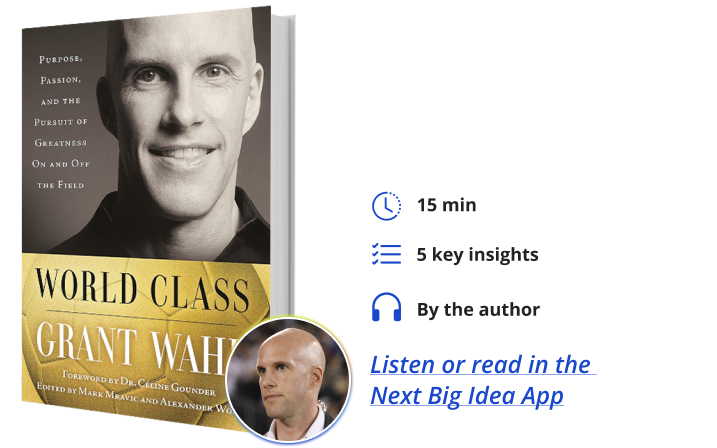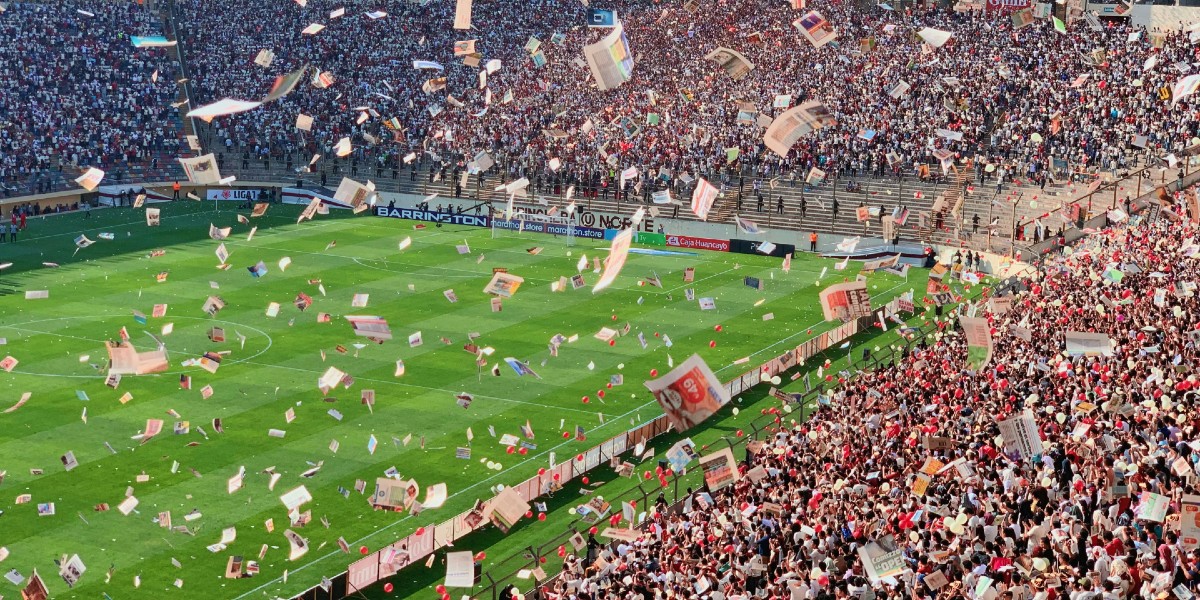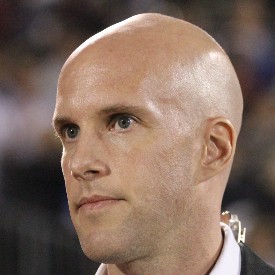Grant Wahl was a sports journalist. He reported at Sports Illustrated for 25 years, was a soccer analyst for CBS Sports, a correspondent for Fox Sports. Grant Wahl was one of the world’s leading soccer journalists and the author of two previous books, Masters of Modern Soccer and the New York Times bestseller The Beckham Experiment. He created and hosted the Fútbol with Grant Wahl website and podcast after his time at Sports Illustrated, where he wrote more than three dozen cover stories. Wahl covered thirteen World Cups (eight men’s, five women’s), seven Olympics, and 10 Final Fours. He was posthumously inducted into the U.S. Basketball Writers Association Hall of Fame and awarded the National Soccer Hall of Fame’s Colin Jose Award for contributions to the American game. Grant Wahl died in 2022 and is survived by his widow, Dr. Céline Gounder.
Dr. Céline Gounder created and presents this Book Bite on behalf of her late husband Grant Wahl. They started dating in college in the fall of 1995 and were together until his death from an aortic aneurysm in December of 2022. Here, she shares five ways that Grant practiced his craft.
Below, Céline shares five key insights from Grant’s new book, World Class: Purpose, Passion, and the Pursuit of Greatness On and Off the Field. Listen to the audio version—read by Céline—in the Next Big Idea App.

1. As a reporter, Grant was fearless but fair.
As a student at Princeton, Grant was the lone voice to criticize Pete Carril when the longtime, much-revered basketball coach retired, but he did so by talking to a range of current and former players and weighing his critique carefully. Here’s how Grant ended his column for the Daily Princetonian:
“The process has been called Darwinism by some, as if losing one smart, talented player after another were a natural event or the fault of the players. Attrition and Darwinism are charitable charitable euphemisms for a coach whose erratic, boundless temper caused him to give up on capable performers. Carril’s doghouse, it seems, had a one-way entrance.
The current case study of the Carril effect—a virus which tears down formerly confident athletes until they are nothing but a frazzled mess of nerves—is Brian Earl, class of ‘99, another former starter who said he had never encountered Carril’s level of maliciousness before last season. Earl, who is considering a transfer to another school, might still return to Princeton next year, but if he does, it will be primarily because Carril has retired.
Ultimately, due to the culture of fear he created for Earl and others, it was Carril himself who most explicitly addressed his excessive tirades. ‘I’m a little too rough, too severe for the kind of kid who comes to Princeton today.’ He said upon announcing his retirement. ‘These kids are getting me at a time when I have less understanding.’
That kind of self-recognition, however understated it may be, is worth applauding, as are Carril’s longevity, determination and prodigious understanding of basketball. Moreover, we will never forget the euphoria of watching the old coach’s final trip to the NCAA tournament, but those successes don’t erase the unceasing, often inhumane torments Carril hurled at his players. Which is why despite his positive attributes, when Pete Carril is awarded an honorary membership in the class of ‘96, I may stand with the crowd but I will not clap.”
2. Grant had a passion for shining light on wrongs that needed righting.
During trips to Qatar before the World Cup, he found and interviewed migrant workers who had been exploited in the rush to build infrastructure for the tournament. Grant’s college mentor was the legendary New York Times Vietnam correspondent Gloria Emerson, whom Grant profiled in a creative writing class for the New Yorker editor David Remnick. Before getting on the plane to Qatar, Grant reread it for guidance and inspiration. Here is its opening paragraph:
“Before getting on the plane to Qatar, Grant reread it for guidance and inspiration.”
“Gloria Emerson does not keep her purple heart framed in the den, or pinned to a uniform, or encased in some quartz paperweight. Instead, she maintains it as she received it in the ribbon form, attached to a rectangle of yellowing tag board. A veteran from Saratoga Springs, New York, sent it to Emerson after he read Winners & Losers. Her rage-filled, chronicle memoir is based on three years of interviewing American families and two as a Vietnam correspondent for the New York Times. ‘He thought I had been wounded also,’ she says.”
3. Grant was a master of capturing championship moments.
Or, as it’s known in football, the trophy lift. The French national team won in Paris on a July night in 1998, and I was with Grant in Paris that summer. As I waited anxiously for Grant to walk across the city and back from the stadium, the streets became impassable, full of celebrating Parisians. He was on deadline for Sports Illustrated, and Grant wrote the piece in his head. It reads like the first rough draft of history. It’s hard to believe that Grant was 22 at the time:
“In Sant-Denis, the Paris suburb where the French once buried their kings, a new one ascended last week. Zinedine Zidane certainly doesn’t look the part. He’s quiet, usually gazing down at the ground. He’s going prematurely bald. He can appear slow and sometimes clumsy. At one point on his way through the interview after the World Cup final on Sunday, he stumbled on the carpet like a young girl wearing her first high heels. Put him on a soccer field though, and he becomes the Niko of the midfield, definitely toe-poking a pass in one direction, gamely looking at a long ball in the other, holding his head, regally erect all the while. It should be noted that Zu, as he is known, never trips on grass.”
4. Grant could take the reader by the hand and deliver what journalists call the explainer.
Grant always had a nose for finding and showcasing the innovators or the architects in the game—no matter how obscure, like a junior college basketball coach named Vance Walberg:
“After the appetizers and the porterhouses had been cleared from the table, [college basketball coach] John Calipari asked Walberg something that no other coach had bothered to ask him, ‘What do you run?’ Walberg laughed, replying, ‘You don’t want to know. It’s a little bit off the wall.’ Calipari insisted, and so using a pepper shaker as the basket, white sugar packets as offensive players, and pink Sweet’ n Low packets as defenders, Walberg explained his quirky creation: a high-scoring scheme featuring four perimeter players and a host of innovations unlike classic motion offense.
“Wahlberg’s scheme was madness. It was genius.”
Walberg’s attack was founded on dribble penetration. To Calipari, it embodied two wholly unconventional notions. One, there were no screens to create spacing for drives. Two, the post player ran to the weak side of the lane instead of the ball side, leaving the ball handler an open driving path to the basket. But there was plenty more. As Walberg pushed the packets through the phases of his offense, Calipari experienced a new kind of sugar rush. Wahlberg’s scheme was madness. It was genius.”
5. Grant took to heart the edict of nonfiction master John McPhee that your lead should shine light through the story.
In a cover story about the teenage LeBron James, Grant describes a scene that places the teenage James in the same frame as Michael Jordan—signaling by association, the future Grant saw. Here’s the lead to a profile of Didier Drogba. Grant evokes Drogba’s native Ivory Coast and conveys how a multimillionaire star of the Premier League is drawn powerfully back home:
“Didier Drogba can close his eyes and recall the smell of the earth during the rainy season in Ivory Coast: the peaty tang that filled the air during warm afternoon cloud bursts. The childhood memory is a touchstone of his Ivorian identity, and part of what draws Drogba back to Africa. To Abidjan, the city of his birth, where he has acquired the land to build a hospital. To South Africa, home of this summer’s World Cup, where his 300-foot-high likeness graces Johannesburg. And even to this remote place, a dusty compound in Angola, where he’s guarded by more assault weapons than a Mexican drug lord.”
You’ll find each of these examples and much more in World Class. I hope you enjoy this tribute to Grant’s life and work.
To listen to the audio version read by Céline Gounder, download the Next Big Idea App today:
































